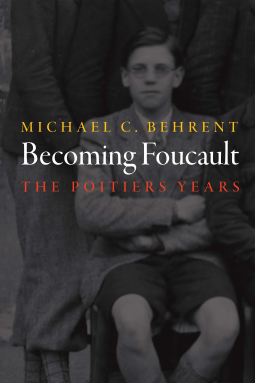
Becoming Foucault
The Poitiers Years
by Michael C. Behrent
This title was previously available on NetGalley and is now archived.
Send NetGalley books directly to your Kindle or Kindle app
1
To read on a Kindle or Kindle app, please add kindle@netgalley.com as an approved email address to receive files in your Amazon account. Click here for step-by-step instructions.
2
Also find your Kindle email address within your Amazon account, and enter it here.
Pub Date Dec 04 2023 | Archive Date Oct 16 2023
Talking about this book? Use #BecomingFoucault #NetGalley. More hashtag tips!
Description
Though Michel Foucault is one of the most important thinkers of the twentieth century, little is known about his early life. Even Foucault’s biographers have neglected this period, preferring instead to start the story when the future philosopher arrives in Paris.
Becoming Foucault is a historical reconstruction of the world in which Foucault grew up: the small city of Poitiers, France, from the 1920s until the end of the Second World War. Beyond exploring previously unexamined aspects of Foucault’s childhood, including his wartime ordeals, it proposes an original interpretation of Foucault’s oeuvre. Michael Behrent argues that Foucault, in addition to being a theorist of power, knowledge, and selfhood, was also a philosopher of experience. He was a thinker intent on making sense of the events that he lived through. Behrent identifies four specific experiences in Foucault’s childhood that exercised a decisive influence on him and that, in various ways, he later made the subject of his philosophy: his family’s deep connections to the medical profession; his upbringing in a bourgeois household; the German Occupation during World War II; and his Catholic education.
Behrent not only reconstructs the specific nature of these experiences but also shows how reference to them surfaces in Foucault’s later work. In this way, the book both sheds light on a formative period in the philosopher’s life and offers a unique interpretation of key aspects of his thought.
Available Editions
| EDITION | Other Format |
| ISBN | 9781512825145 |
| PRICE | $45.00 (USD) |
| PAGES | 320 |
Available on NetGalley
Average rating from 3 members
Featured Reviews
a competent, well-researched biography that becomes surprisingly gripping as its main subject becomes older. i studied foucault’s texts extensively throughout my degree, but i’d never really stopped to research his background or his earlier years, and this was a perfect way to get to know the way his life went before he became one of the brightest minds of the twentieth century.
 Willy M, Reviewer
Willy M, Reviewer
This book is detective work on the part of Behrent, who skillfully takes the times and surroundings of the young Foucault and completes a picture that even his exhaustive biographies so far did not fully capture.
What we get is a broad view of a battle ground. A number of important conflicts and contradictions were present in the development of France. Power meant to liberate, turned into the abuse of some for the benefit of others, all in the name of justice.
Before the Second World War, France's Third Republic had the ideal of science being the ultimate guide to social development and social liberation. Where science and its technology led, then social orders of France must go.
Science was a power in the land and a very brutal and merciless power if you were one of the deviants the system was trying to eradicate. Scientific technocratic control was ubiquitous throughout France and consequently it was an important influence in the most intimate way on the young Foucault's life. As a homosexual he was in the cross hairs of this social control.
Then there are the other two influences shown in the book. The fascist takeover of France during the Second World War and the social revolution that occurred after its fall. Behrent shows how these elements were important and how they affected his work and life. Simply put what is power and what is liberation. Foucault felt deeply these events and would constantly come back to these experiences in his work.
By the end of the book Behrent brings you right there with Foucault as he begins his brilliant career, you feel the sense of disquiet Foucault feels as he tries to work through the confluence of those experiences to produce his great works on Madness, Power, Discipline and Sexuality. This is a great book to begin to understand Foucault. I highly recommend this book.






